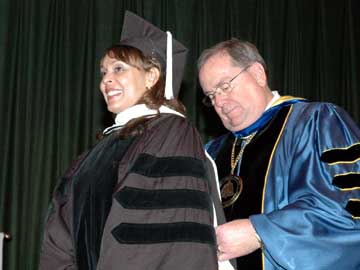

Mississippi native and 2007 Pulitzer Prize winner Natasha Trethewey was named the nation’s 19th poet laureate on Thursday. Among her many honors and distinctions, Trethewey holds an honorary doctorate from Delta State University, the first honorary degree of her career.
Trethewey was conferred the Doctor of Arts and Letters degree during Delta State’s 2007 Fall Commencement ceremony.
When conferring the degree, Delta State President Dr. John Hilpert stated, “Ms. Trethewey is an accomplished poet who has achieved international recognition. Her Mississippi heritage makes all of us proud. We’re pleased to present her an honorary doctoral degree from Delta State. Her success is a wonderful story for our students and graduates to hear.”
Of her degree, Trethewey offered, “My sincere thanks to Dr. John Hilpert, Professor Don Allan Mitchell and Delta State University. I can think of no greater homecoming than one that allows for fellowship with good people and good letters.” Delta State University awarded to Trethewey.
An English and creative writing professor at Emory University in Atlanta, Trethewey is also Mississippi’s Poet Laureate.
Her friend and Delta State Assistant Professor of English Don Allan Mitchell said, “Natasha Trethewey is a fine poet, but an even finer human being. I cannot think of a more perfect American ambassador of poetry than someone who is so humble, so accessible, and so gifted. Plus, she understands the importance of bringing the best of poetry to small American towns such as Gulfport and Cleveland.”
Trethewey will be the first poet laureate to take up residence in Washington in January 2013 and work directly in the library’s Poetry Room since the position was created in federal law. Her term, beginning in September, coincides with the 75th anniversary of the poetry center a a poet consultant position at the world’s largest library.
Trethewey won the 2007 Pulitzer Prize for her poetry book, "Native Guard," that focused partly on history that was erased because it was never recorded. She wrote of the Louisiana Native Guard, a black Civil War regiment assigned to guard white Confederate soldiers held on Ship Island off Mississippi’s Gulf Coast.
The Confederate prisoners were later memorialized on the island, but not the black Union soldiers.
Her first poetry collection, “Domestic Work,” won the inaugural 1999 Cave Canem Poetry Prize, a 2001 Mississippi Institute of Arts and Letters Book Prize and the 2001 Lillian Smith Award for Poetry.
Trethewey’s follow-up collection, “Bellocq’s Ophelia,” received the 2003 Mississippi Institute of Arts and Letters Book Prize, was a finalist for both the Academy of American Poets’ James Laughlin and Lenore Marshall prizes and was named a 2003 Notable Book by the American Library Association.
In addition to the 2007 Pulitzer Prize for Poetry, “Native Guard” also won the 2007 Mississippi Institute of Arts and Letters (MIAL) Book Prize.
Her Pulitzer-winning poems also included her personal history as the daughter of interracial parents – and the story of her mother, who died at the age of 40.
Trethewey also wrote “Beyond Katrina: A Meditation on the Mississippi Gulf Coast” published by the University of Georgia Press in 2010. It is a collection of poetry, essays, and letters co-written with her brother, Joel Grimmette, and grew out of her lecture for the distinguished Page-Barbour and James W. Richard Series at The University of Virginia in 2007. It too won an MIAL Book Prize.
Trethewey’s next collection of poems, "Thrall," will be published this year. It explores her relationship with her white father and shared and divergent memory within families.
Mitchell also added, “Natasha Trethewey is like Walt Whitman, Gwendolyn Brooks, and Langston Hughes before her. She, too, sings America—with the echo of the call-and-response shout of the Mississippi blues. And like those Mississippi blues singers of old, she too will be packing her suitcase and hitting that long highway harder than she ever has before, all in the name of promoting the cause of American poetry. She is more than up to that task, and Mississippi is completely behind her. Dr. Trethewey also knows she will always have a home just off that highway, right here at Delta State University.”

